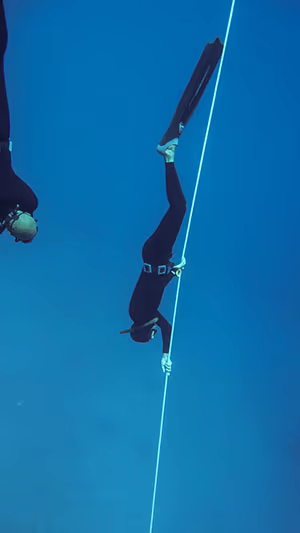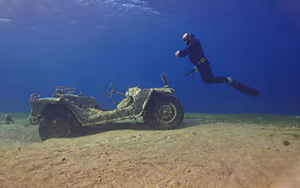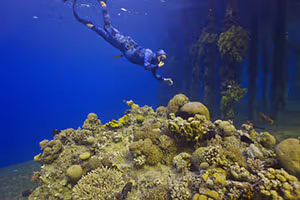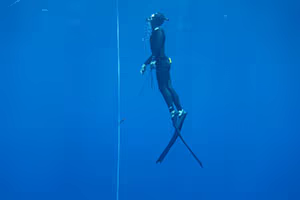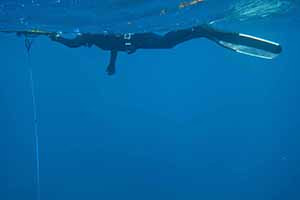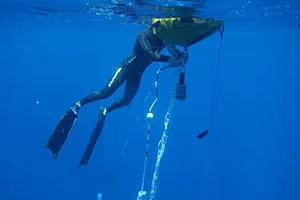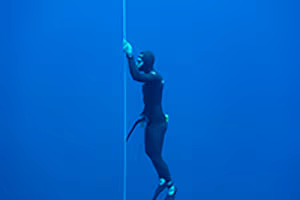Freediving Courses & training in Aqaba/Jordan
Abood Freediver, teaching Freediving Courses in Jordan-Aqaba-Red Sea.
We also conduct workshops and coaching on advanced equalization, free-immersion technique, monofin technique, and all of the freediving disciplines
Why Do I Need a Freediving Course?
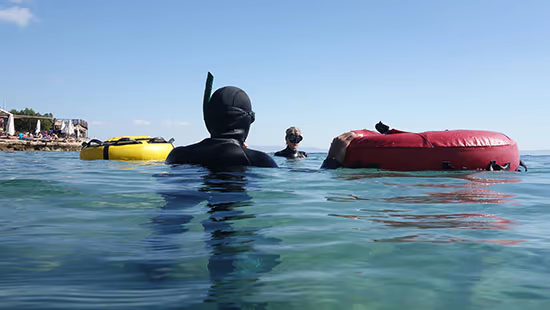
There is a lot to know about safety and physiology. A non-trained freediver risks ear, sinus, and lung injuries, blackouts, and could potentially drown.
An experienced, insured freediving instructor can help you advance your skills and avoid serious risks.
If you already have some freediving experience, the expert techniques taught by our Freediving instructors can help you quickly increase depth and time underwater but also enhance your personal and buddy-related safety skills.
people are learn freediving for a different reasons, but there
are five general ones you hear often.
1- Relaxation and peace. Being underwater holding your breath
and “weightless” is a great stress reducer. It helps people relax
and be “in the moment.” Many freedivers say that the “free” in
“freediving” doesn't just mean free of gear, but free of the outside
world.
2- Simplicity. Because it involves less gear, it's easier to have your gear
with you and there's less involved with going freediving than other
watersports. This often makes freediving more spontaneous and
accessible than other watersports, including scuba diving.
3- Close to nature. Freedivers move quietly and quickly through the
underwater world, much like they belong there. You can get much
closer to many shy organisms than you can by most other means,
including conventional scuba.
4- Challenge and competition. For some, freediving is about the
challenge - internal competition in which you try to improve
your own performance, and/or external competition with other
freedivers. It is one of the few forms of competitive diving.
5- Journey into yourself. All forms of freediving require you to learn
about yourself, your body and how you think. It is a process of
keeping fi t and growing - a journey - that continues as long as you
freedive. For most freedivers, this is a primary - or at least important
- reason for freediving, regardless of what else attracts them to the
sport.
Freediving in Aqaba/Red Sea
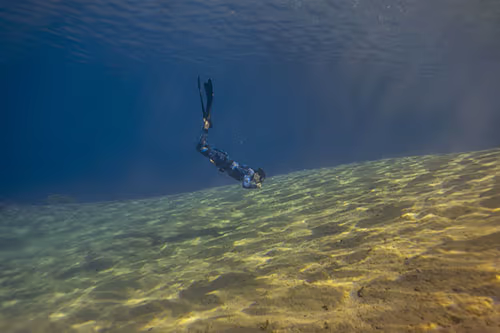
Why freediving in the Gulf of Aqaba - Red Sea?
Aqaba on the Red Sea is characterized by moderate temperatures throughout the year, ranging from 21 degrees in winter to 27 degrees Celsius in summer. As is well known, visibility in the Red Sea waters is clear, with visibility ranging from 10 meters to approximately 30 meters. What distinguishes the Gulf of Aqaba is the lack of high waves, which may be disturbing to some freedivers, in addition to the lack of water currents.
Aqaba is called the Bride of the Red Sea and is a natural gem with its picturesque coral reefs, clear waters and rich marine biodiversity that make it a haven for water sports enthusiasts, especially freediving. Freediving is also becoming increasingly popular in Aqaba due to the region's enchanting underwater landscapes and the sense of tranquility that the surrounding environment provides. This experience is as much about connecting with nature as it is about pushing the limits of physical and mental endurance.
Aqaba is also home to a rich variety of marine life, including colorful coral reefs, tropical fish and other amazing species. Freedivers often explore these vibrant ecosystems, enjoying the beauty and tranquility of the underwater world.
There are also many popular diving sites in Aqaba that cater to freedivers. These sites often feature valleys and walls surrounded by coral reefs, in addition to shipwrecks, aircraft, and sunken military vehicles, making them suitable environments for coral reefs to grow and fish of various kinds. They are very wide with diving sites that provide diverse environments to explore.
Physical and Mental Benefits of Freediving
Freediving is not just a recreational sport; it is also an activity that enhances physical and mental health. Freediving requires a large lung capacity, focus, and control, which improves over time with training and practice,
It's also requires maintaining proper posture and control while in the water, which strengthens mental control of the body's muscles. In addition to strengthening the muscles due to their use with low oxygen (unaropec). Breath-holding exercises also improve lung capacity and respiratory efficiency,
requires calmness of mind and breathing as well, principles that yoga and meditation share. The deep connection with nature and the tranquil underwater environment also promotes mental relaxation, helping divers reduce stress and anxiety. Many freedivers describe their underwater experiences as meditative,
This sport also encourages individuals to focus fully on their bodies and their surroundings, as any stress or tension can affect their ability to dive. Freedivers often train their minds through visualization techniques and controlled breathing, which improves mental discipline and resilience in other aspects of life.
Freediving is one of the oldest forms of diving, dating back thousands of years. From the ancient pearl divers of the Arabian Gulf to the freedivers of Japan, humans have practiced freediving for sustenance and trade. Over time, this practical activity has evolved into a recreational and competitive sport. The activity has grown globally, with modern freedivers often seeking a deeper connection with the ocean while challenging themselves to explore its depths using only the power of their breath.
In Aqaba, freediving has become a sought-after activity due to the beauty of the Red Sea. Known for its rich marine biodiversity, clear visibility, diverse ecosystems and shipwrecks, the Red Sea provides an ideal environment for freediving enthusiasts of all levels. The history of freediving in the Red Sea is intertwined with the natural beauty of the coral reefs and the many legends of ancient sea explorers.
How is the freediving in the red sea like & what I can see?
Frequently Answered Question
How long is a Basic freediving Course?
The duration of a freediving course can vary depending on the level and intensity of the course, as well as the organization offering it
Typically, basic freediving courses for beginners can range from one to three days, covering essential theory, safety procedures, breathing techniques, and introductory practical sessions in confined water (e.g., swimming pool).
Basic freediver course
Freediver Course
Advanced courses may span several days to weeks, with more in-depth training, practice sessions in open water environments, and possibly certification requirements. Some organizations offer extended courses that last several weeks or even months for those seeking professional-level certifications or instructor training.
Advanced freediver
What is the NO 1 rule in freediving?
The number one rule in freediving is safety. Safety should always be the top priority for anyone engaging in freediving activities This includes understanding and adhering to proper techniques, equipment usage, buddy procedures, depth limits, and always diving within one's limits. Additionally, being aware of environmental conditions, such as currents and visibility, and having a reliable buddy system in place are crucial aspects of ensuring safety in freediving. Ultimately, the goal is to enjoy the sport while minimizing risks and prioritizing personal well-being and that of others.
What is the best training for freediving?
The best training for freediving encompasses a combination of physical conditioning, breath-hold techniques, mental preparation, and safety education. like Breath-Hold Techniques, Physical Fitness, Equalization Techniques, Safety and Rescue Skills, Mental Preparation...etcMore info about Freediving training
Is freediving good for lungs?
Freediving can have positive effects on lung function and respiratory health, but it's essential to approach it safely and gradually, especially if you're new to the sport.
how freediving can potentially benefit the lungs
Click to read How does it happend
How do I find freediving buddy?
You can Find a reliable freediving buddy in this places.
Local Freediving Clubs or Groups: Look for local freediving clubs, groups, or communities in your area. These organizations often host training sessions, social events, and group dives where you can meet other freedivers and potential buddies.
Freediving Courses and Workshops: Attend freediving courses, workshops, or certification programs offered by certified instructors or training agencies. These courses often involve practical training sessions with other participants, providing opportunities to connect with fellow freedivers who may become potential buddies.
Online Forums and Social Media: Join online forums, social media groups, and communities dedicated to freediving. Websites like Reddit, Facebook, or specialized freediving forums allow you to connect with other freedivers, ask questions, and seek out potential buddies in your area or for specific dive trips.
Local Dive Shops: Visit local dive shops or dive centers that offer freediving equipment, training, or activities. These establishments may have bulletin boards, events, or networking opportunities where you can meet other freedivers and find potential buddies.
Attend Freediving Events or Competitions: Participate in freediving events, competitions, or gatherings in your region. These events attract freedivers of all levels and provide opportunities to meet like-minded individuals who share your passion for the sport.
Ask Within Your Network: Reach out to friends, family members, or acquaintances who may have an interest in freediving or know someone who does. You might be surprised to find potential buddies within your existing social circle.
How far can beginner freediving?
For most beginners who are just starting out in the sport, it's common to see distances ranging from 25 meters (approximately 82 feet) to 50 meters (approximately 164 feet) or more in a controlled environment such as a swimming pool. However, it's important to note that these distances are not set benchmarks and can vary greatly from person to person.
As beginners progress in their freediving training and gain more experience, they may gradually increase their dynamic apnea distances over time through consistent practice, proper technique refinement, and physical conditioning. It's essential for beginners to focus on safety, relaxation, and building a solid foundation of breath-hold skills before attempting longer distances or deeper dives.
Does PADI do freediving?
Yes, PADI (Professional Association of Diving Instructors) offers freediving courses and certifications alongside its scuba diving programs. PADI has developed a comprehensive freediving curriculum designed for individuals of all experience levels, from beginners to advanced freedivers. PADI freediving courses typically cover essential topics such as breath-hold techniques, safety procedures, equalization methods, relaxation, and diving physiology. Courses are conducted by certified PADI Freediver Instructors who provide instruction, guidance, and supervision throughout the training. PADI freediving courses are structured to cater to the needs of recreational freedivers, spearfishers, and individuals interested in exploring the underwater world without scuba equipment. Upon successful completion of a PADI freediving course, participants receive certifications indicating their proficiency in freediving skills and knowledge. PADI's entry-level freediving course is called the Freediver course, which introduces students to the fundamentals of freediving and lays the groundwork for safe and enjoyable breath-hold diving experiences. As students progress, PADI offers advanced freediving courses, specialty courses, and instructor-level training for those interested in furthering their skills and knowledge in the sport. Whether you're a beginner looking to explore freediving for the first time or an experienced diver seeking to enhance your skills, PADI offers a range of freediving courses to suit your interests and goals. It's important to train with certified instructors and reputable training agencies like PADI to ensure a safe and enriching freediving experience.
What is the difference between Basic freediver & freediver?
The terms "Basic Freediver" and "Freediver" are not standard designations used in freediving certifications or terminology. However, I can provide an explanation based on common usage and understanding within the context of freediving.
Basic Freediver: it's an introduction to freediving for the complete beginner. It aims to develop the skills, knowledge and safety procedures necessary to enjoy freediving safely within the student limits of experience. The PADI Basic Freediver course is not aimed for competitive freediving but more for recreational freediving. usually the particpant learn essential freediving skills in confined water, such as static apnea and dynamic apnea.
Freediver is the first step into freediving, The course is designed to prepare the particpants to freedive in the dynamic open ocean conditions. the particpant learn and practice fundamental skills so they can freedive safely and efficiently. After completing the course the particpant will be able to plan and execute safe freedives in the sea as one of a responsible and competent buddy team. This is a comprehensive course where the particpants are taught in the classroom, confined water and open water.
How deep is the PADI level 1 freediver?
The PADI Basic Freediver course, which is often referred to as Level 1, does not have a specific depth requirement for certification. Instead, the course focuses on developing foundational skills and knowledge to safely and confidently engage in freediving activities. During the PADI Basic Freediver course, participants typically learn essential freediving skills such as breath-hold techniques, equalization methods, relaxation, and safety procedures. Practical sessions may include static apnea (breath-holding while stationary), dynamic apnea (swimming underwater on a single breath), and basic open water freediving skills. While there isn't a set depth requirement for the Basic Freediver certification, participants are typically introduced to freediving in confined water environments such as swimming pools or shallow open water settings. The emphasis is on mastering fundamental skills and building confidence before progressing to deeper dives. After completing the PADI Basic Freediver course, participants receive a certification indicating their proficiency in basic freediving skills. It's important to note that certification as a PADI Basic Freediver Level 1 does not necessarily mean that a diver has reached a specific depth, but rather that they have demonstrated competence in essential skills and knowledge for safe freediving practices.
How long does freediving training takes?
The duration of freediving training can vary depending on several factors, including the level of training, individual progress, and the specific curriculum of the course or program.
Basic/Entry-Level Courses: Basic freediving courses designed for beginners usually range from one to three days in duration. These courses cover essential theory, safety procedures, breathing techniques, and introductory practical sessions in confined water (e.g., swimming pool). The duration may vary depending on the training organization and the depth of material covered.
Intermediate Courses: Intermediate-level freediving courses typically span several days to a week, providing more in-depth training and practice sessions in open water environments. These courses build upon the skills learned in basic courses and may cover topics such as advanced breath-hold techniques, equalization methods, and deeper dives.
Advanced Courses: Advanced freediving courses can extend from several days to weeks, with intensive training and practice sessions aimed at enhancing freediving skills, depth capabilities, and safety awareness. Advanced courses may focus on specific aspects of freediving, such as deep equalization, advanced rescue techniques, or competitive freediving strategies.
Specialty Courses: Specialty freediving courses, such as spearfishing or underwater photography, may vary in duration depending on the specific focus and depth of material covered. These courses often build upon the skills learned in basic or intermediate courses and may range from a few days to several weeks, depending on the complexity of the subject matter.
Professional-Level Training: For those seeking to become certified freediving instructors or pursue professional-level certifications, training programs may span several weeks or months. These programs include comprehensive theoretical instruction, practical teaching exercises, and evaluation components to ensure competency in instructing and mentoring other freedivers.
How long is a freediving Course?
This entry-level course typically takes around 2 to 3 days to complete. It covers the basics of freediving, including safety procedures, breathing techniques, and diving fundamentals. Freediver Course
More Frequently Answered Question

